The crowded room of parents was the predictable mixture of excitedly curious, silently awkward, and nervously giddy. I was leading another seminar for Christian parents talking about how to do sex education at home.
As usual, I was approached afterward by several parents who had more specific questions, but I wasn’t quite prepared for one woman’s comment. She said, “I really enjoyed your talk, but I just got really nervous when you used the p-word and the v-word.”
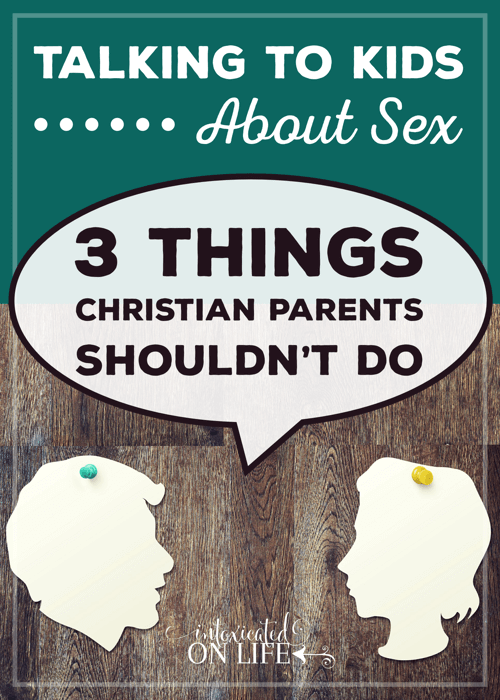
I looked at her with a blank stare for a few moments, and then said (probably with a dumbfounded look), “Do you mean ‘penis‘ and ‘vagina‘?”
She blushed even more—a feat I had not thought possible, since she was already beet red when she approached me—and said, “Yes, those words.”
I was frank with her, “Look, if you get embarrassed and sheepish listening to a talk in a room full of adults who are here for the express purpose of learning about sex education, no wonder you’re nervous talking to your kids.” We talked for a while about the need to push through her fear, and she walked away—probably somewhere in the direction of the nearest hole in the ground she could bury her head in.
Sex is Good. Sex is Powerful.
The Bible isn’t nearly so sheepish about sex—rather, the opposite.
Right away in the first chapters of Genesis, before sin enters the picture, we are told two important truths about sex: it is good, and it is powerful.
- Sex is a good gift from a good God. Right after the creation of both male and female—and his joyful command to the first couple to be fruitful and multiply—God pronounces his creation “very good” (Genesis 1:31). The very first recorded human words are those of Adam after first seeing his naked wife—poetic words about how she was perfectly suited for him (Genesis 2:23). Even after sin enters the human race, the goodness and pleasure of sex is echoed all throughout the Bible (The Song of Solomon, Proverbs 5:15-19; 1 Corinthians 7:1-7).
- Sex is a powerful gift to be enjoyed only as God instructs. Genesis says sex has the power to create life (Genesis 1:28) and unite two people together spiritually in a profound way (2:24). Keeping in mind this great power, God forbids sexual intercourse outside of the covenant of marriage (Exodus 20:14; 1 Corinthians 6:18; Hebrews 13:4). God’s commands about sex, therefore, are not out of prudishness but out of respect for the power God infused into sexuality.
3 Ways Sex Ed Goes Wrong
Keeping these two facets of sex in mind, there are several ways sex education can go wrong in the Christian home.
- We can either affirm the goodness of sex or deny/ignore its goodness.
- We can either affirm the power of sex or deny/ignore its power.
This offers us 4 “attitudes” about sex education—these are dispositions that come through in the words we use, the conversations we start (or avoid), our overall “tone,” and the frequency of our dialogues with our kids.
The diagram below shows how these attitudes impact the hearts of our kids. (Keep in mind, these are generalizations.)
Sex ed goes wrong when both the goodness and power of sex are ignored.
Some homes are places where both the goodness and power of sex are ignored/denied—thus the topic is generally avoided altogether. These parents let their children wander into the minefield of society’s sexual messages because they are without any real guidance (box #4 above).
Sex ed goes wrong when the goodness of sex is stressed but its power is ignored.
Other homes are places where the goodness of sex is stressed, but its power is ignored/denied. This is essentially the what ethically liberal cultures say about sex. Sex is treated as one of the greatest goods, even a great “need,” but its power is largely ignored. Sex is seen as fitting anytime and anywhere (as long as it’s consensual), but little is said about sexual responsibility (except maybe passing references to contraception). Parents who have this attitude tempt their children into the minefield of society’s sexual messages (box #3 above).
Sex Ed goes wrong when its power is stress but its goodness ignored.
Other homes are places where the power of sex is stressed but its goodness is ignored/denied. This is what you see in overly conservative cultures. Parent with this attitude treat sex like radioactive material. Their attitudes suggest sex is either icky or they treat the sexual impulse with automatic suspicion. In the most extreme cases, sex is treated as a “necessary evil” that appeals only to our lower nature. When children in these homes enter puberty, they either absorb their parent’s prudish spirit, or (more likely) they rebel. Parents with this attitude chase their children into the minefield of sexual temptation (box #2 above).
Leading Our Children Through the Minefield
In homes where both the goodness and power of sex are affirmed, children are led through the minefield of society’s sexual messages (box #1 above).
- Parents in these homes help their children avoid sexual pitfalls, helping them distinguish truth from error in the world around them.
- These parents help their children grow through their sexual development.
- These parents teach their kids to see sex as a great blessing—and like all blessings, one that must be handled responsibly.
Free Sex Ed Mini-Course for Christian Parents
Still, even with the right attitude in mind, a lot of parents want to know how to talk to their kids about godly sexuality. That’s why my wife and I have released a mini eCourse for parents—three easy-to-follow videos that will teach you…
- Why it is important to talk early and talk often with your kids about sex
- What sex education looks like, stage by stage
- How to break the ice with your kids and have proactive discussions

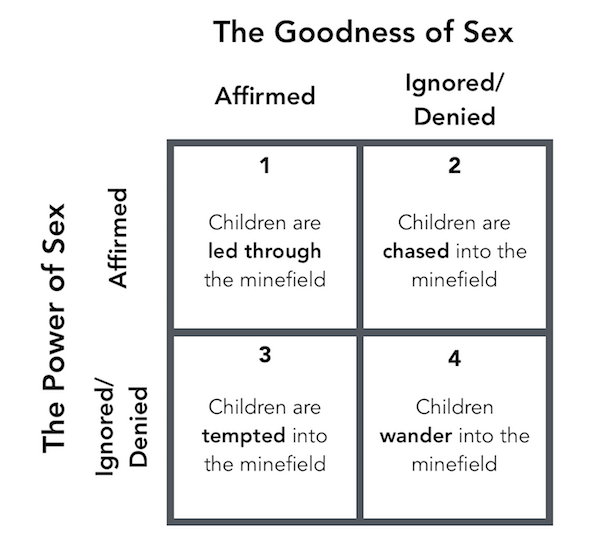
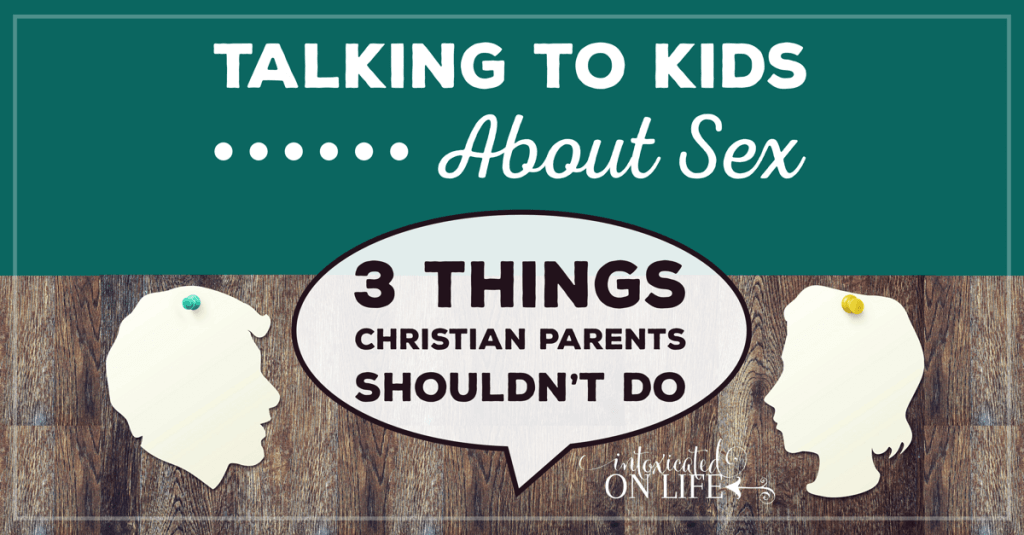
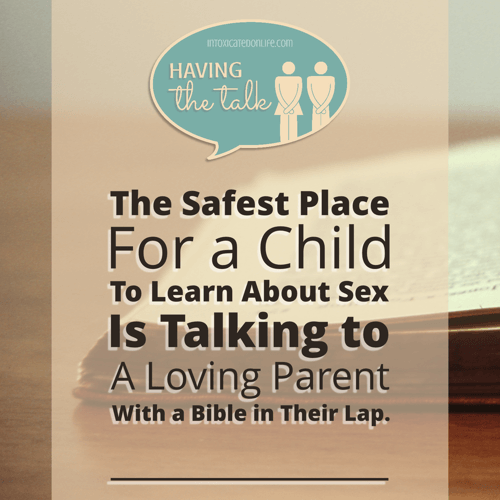


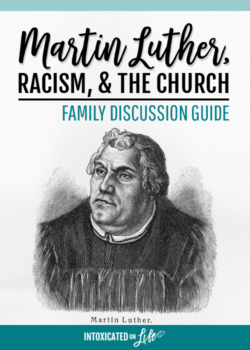






I think many of us were raised without any talk of sex. I learned so much about the beauty, power and gift of sex when I read Pope John Paul’s theology of the body. It is worth the read for anyone. Thanks for sharing on Let’s Get Real.
Theology of the Body has done a lot of good.
Wow, this is so great. I wish there were more education for Christian parents to discuss sex ed in a safe and truth-filled way like you’ve shared. It would make a huge difference on giving kids and teens a better understanding of this gift from God.
Thanks, Elena!
I am at a place of “when should this be taught?
I want to preserve my children’s innocence as long as I can and feel like the public schools tempt children by teaching this (at all really as it is aParent’s place, not the school system’s) at 5th grade regardless of the maturity level. My daughter is only 8, but I am a childbirth educator also so she sees birth all the time and has never wondered how the baby gets in there to begin with.
I am signing up for the ecourse today 🙂
Great! I’m eager to hear what you think of it, especially as a child birth educator!
My children have never inquired about how a baby is made. My eldest is 8. Do I wait for them to ask?
There’s not necessarily an “ideal” age to talk about these things (because all kids are different), but 8-9 is what I would consider a good average age for beginning these talks.
We unabashedly promote a proactive approach when it comes to this subject. We think there is a huge value of being first when it comes to discussing human sexuality, because the world is more than happy to fill in the void. That said, remember “how a baby is made” is just one part of discussing human sexuality. Ideally, kids would learn about sex in its variety of facets over years of conversations, not just in one massive conversation. So don’t be afraid to break the ice on this subject with your oldest. That’s exactly what our books are designed to do.
We are putting together a curriculum at our church to “equip” parents of young children on how to educate their children Biblically about sex.
I purchased your three book series on “The Talk.” Do you by chance have any DVD’s that would go along with the books to assist in presenting the information in the books?
Thanks,
Bruce
We don’t have DVDs we do however have a couple of streaming courses that we offer group licensing options for. This allows you to use the courses with a group of parents now and even in the future too. You can find out more about the 2 courses here.